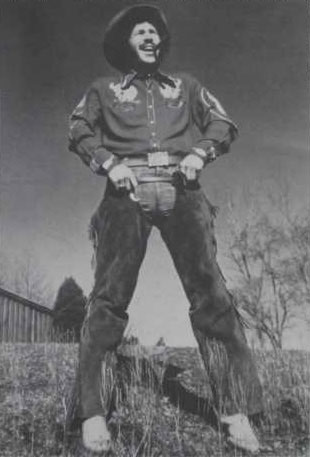Musician, novelist, raconteur and occasional politician Kinky Friedman died at 79 on June 27, 2024.
Friedman was country when country wasn’t cool. In the ’70s, when virtually all his peers were into rock, the Texas-born Friedman took an extreme approach to his work. As an ethnic rarity—a Jewish country singer—he formed a backing band called the Texas Jewboys. The group’s name alone, a spoof on the almost sacred institution of Bob Wills & the Texas Playboys, was enough to raise eyebrows among many country music fans.
But Friedman’s forte often seemed to lie in his sheer offensiveness. His outrageous persona was a unique cross between Don Rickles and Woody Guthrie. He came across onstage as an old-style Texas country bandleader, except he wore a mezuzah and Star of David around his neck and used obscenities.
“We irritated a lot of people. We got up the sleeves of just about everybody,” Friedman said prior to a concert at Denver’s Mercury Café in 1992. “We were chased out of town by rednecks, blacks, Jews, homosexuals. Women were the worst—feminists went crazy on us.”
Most of Friedman’s best material appeared on 1973’s Sold American, a remarkable debut album. The raucous “We reserve the Right to Refuse Service to You” was about the hostility a Jewish longhair encounters in a redneck café—and in a synagogue. “The Ballad of Charles Whitman” was perceived as tasteless.
Yet Friedman could get self-deprecating and a little serious, writing capable and exceptionally witty songs. The classic title track was a piercing look at a faded cowboy star looking for a cheap high and wondering where the kudos went. “High on Jesus,” “Top Ten Commandments” and his signature “Ride ’Em Jewboy” made a big splash.
Friedman’s self-titled second album featured songs like “They Ain’t Makin’ Jews Like Jesus Anymore” (produced by Willie Nelson), and his charisma won friends and influenced people among the rock establishment. Many contributed to 1976’s happily indulgent Lasso from El Paso—for example, Ringo Starr put in a cameo appearance on the riotous bad-taste parable “Men’s Room, L.A.”
Friedman was also given prominence on Bob Dylan’s Rolling Thunder Revue, in which several different artists performed with Dylan in loose-format concerts across America (Lasso from El Paso included a live version of “Sold American” recorded in Fort Collins).
The National Organization of Women awarded Friedman the 1974 Chauvinist Pig of the Year award for “Get Your Biscuits in the Oven and Your Buns in the Bed.” And there was a lawsuit from advice columnist Abigail Van Buren over his song “Dear Abbie.” “I was fuckin’ blown away,” Friedman said. “The subtitle was ‘Steal This Song’—it’s obvious to anyone with a brain the size of a Le Sueur pea that it’s about Abbie Hoffman.”
But despite his rising profile, public response continued to be disappointing, and Friedman didn’t make any records during the ’80s. Country artist David Allen Coe explained it: “You gotta understand, the music business is basically run by Jewish people, and the image thrown up by Kinky Friedman & the Texas Jewboys was not something they wanted to promote.”
So Friedman searched for “a lifestyle that didn’t require my presence.” One night he rescued a woman from a mugger at an automated bank. Right away he wrote his first mystery novel, Greenwich Killing Time, on his ranch in Texas. “Seventeen publishers rejected the manuscript, at which time I knew I had something pretty hot,” Friedman said.
He did. He would become a successful writer of crime novels—A Case of Lone Star, When the Cat’s Away and Elvis, Jesus and Coca-Cola among them. The Mile High Club, the last book in his popular detective series, “is about a woman who goes back to the lavatory as an airplane is coming into LaGuardia. She asks me to keep an eye on her carry-on bag, and she disappears. It’s a departure from my other work in that it has a plot and a surprise ending. It’s the first mystery that involves a cat dumping in a loft as a major clue. Mojo Nixon asked me if I belonged to the Mile High Club. I said no, I didn’t. He said he was a solo member.”
“The Kinkster” was playing music again in the ’90s. “Instead of an old country singer, I’m a new comic, and real Americans seem to get it this time around,” he mused. “I try to preach to the choir. Stupid people think I’m a bigot or a racist, others think I’m holding a mirror up to them. I dunno, bigots and racists need to be entertained like anyone else.”
Friedman performed at Herman’s Hideaway in 2000, his first Denver club date in seven years. He brought along Little Jewford (born Jeff Shelby), a founding member of the Texas Jewboys. “He’s the last surviving member who’s still ambulatory,” Friedman said. “He killed them in Australia—he’d say things like, ‘I am the Lindbergh baby.’ He’s the president and CEO of Sphincter Records—our motto is ‘Leaving our competitors’ behind.’”
A record was made of their European tour, Classic Snatches from Europe. “It’s mostly comedy bits and reprisals of our old songs. We did a few shows in Germany. As you know, the Germans are my second favorite people—and my first is everybody else! In Cologne, a blind woman from Paris came to the show with her seeing-eye dog. We brought ’em both up onstage and sang ‘Old Shep,’ a very poignant moment. Afterward, she invited us to Paris on a day off. So I asked the German promoter, ‘How far from Cologne to Paris?’ He said, ‘Oh, about four days’ march.’”


